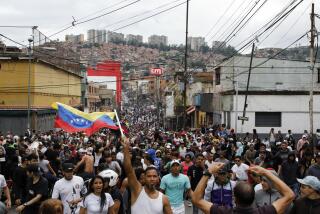Kyrgyzstan’s Acting President Wins Election by a Landslide
- Share via
BISHKEK, Kyrgyzstan — Acting President Kurmanbek Bakiyev, a former opposition leader who led a March revolt that ousted his predecessor, won by a landslide in balloting here Sunday, giving fresh legitimacy to his team of reformers in this mountainous Central Asian state.
With 96% of the ballots counted, Bakiyev had 89% of the vote in a field of six candidates, according to the Central Election Commission website. It reported turnout at 75%, far above the 50% threshold required to make the election valid.
This mostly Muslim nation of 5 million has drawn international attention because of its location in the heart of post-Soviet Central Asia and its potential role as an outpost of democracy in a part of the world known for authoritarian regimes. A U.S. military base near Bishkek, the capital, serves as a staging area for U.S.-led coalition forces fighting in Afghanistan. Russia also has a base here.
The new authorities have tried to burnish their democratic credentials, pledging a fair election and allowing the country’s first televised presidential debates. Among the reforms in election procedures was the country’s first use of finger inking to guard against repeat voting. Bakiyev and his allies have indicated they believe that winning international recognition as a genuine democracy will help them stabilize the country and attract foreign investment.
Critics, however, charged that Bakiyev took advantage of his role as acting president to manipulate media coverage during the campaign. He skipped the final debate Friday, to the frustration of his challengers.
“These elections are unique because for the first time elections are being held that can be called real elections,” Bakiyev said Sunday after casting his ballot. “No one is pressuring anyone or telling them how to vote. I want to stress that the election will be honest, transparent and in strict accordance with the requirements of the electoral code and the Organization for Security and Cooperation in Europe.”
The OSCE sent about 300 election monitors. Its criticism of the conduct of parliamentary elections earlier this year lent weight to protesters’ allegations of fraud, which triggered the largely nonviolent March revolution that ousted President Askar A. Akayev. The OSCE will give an assessment today regarding this election.
“This election is being called an election of hope,” Yuruslan Toychubekov, Bakiyev’s campaign manager, said in an interview late Sunday, as the exit poll and very early returns indicated a huge Bakiyev victory. “People are tired of corruption, tired of meaningless words.”
Toychubekov credited the size of Bakiyev’s victory to his alliance with other reformers who chose to be part of his team rather than run against him -- in particular Felix Kulov, Akayev’s former security chief, who was imprisoned after breaking with his former boss. Kulov, seen as the strongest potential challenger to Bakiyev, pulled out of the race after he was promised the prime minister’s post.
Bakiyev is from the country’s poorer and more traditional south, whereas Kulov is a northerner. This spring, when it looked like they might run against each other, there were fears of a regional clash and continued instability if supporters of the losing candidate were unwilling to accept the results.
“The alternative candidates were very weak because many strong leaders came together on one team,” Toychubekov said. “This will be a team that cares for every person, and we think everyone will be equal before the law. We will build a fair society, and people will be rewarded as they deserve.”
Bakiyev’s team will focus its economic policies on Kyrgyzstan’s great hydroelectric potential, its mineral resources including gold, and an effort to develop agricultural processing and high-tech industries, Toychubekov said.
With the Bush administration pushing for the spread of democracy, Kyrgyzstan is a place where success could have major influence on other predominantly Muslim states, particularly oil-rich Kazakhstan and Uzbekistan, which also has a U.S. military base. The March revolution has raised hopes among democracy activists and opposition politicians in neighboring countries, while prompting Kazakh and Uzbek authorities to tighten their grip.
Bishkek residents interviewed Sunday overwhelmingly backed Bakiyev, although some said their real favorite was Kulov.
“I like it that Bakiyev made a tandem with Kulov,” said Almagul Astarkulova, 43, a barbershop employee. “I believe two strong leaders have united, and I strongly hope we’ll have a good, stable economy. Of course, when they’re together it’s a guarantee there won’t be a war, there won’t be conflict between north and south. Now we’ll strive together for a better life. This is a very good thing.”
After the polls closed, local election commission members at the school where Kulov voted seemed sincere but inexperienced. It took them three tries before they could agree that the polling station had 490 unused ballots out of the 1,438 it had been allocated.
They struggled for several minutes to figure out how to open a plastic box that had been used for at-home balloting by disabled voters. Only then, more than an hour after the polls had closed, did they open the station’s large transparent ballot box and start counting votes.
More to Read
Sign up for Essential California
The most important California stories and recommendations in your inbox every morning.
You may occasionally receive promotional content from the Los Angeles Times.










